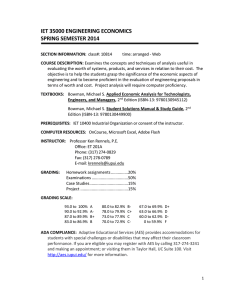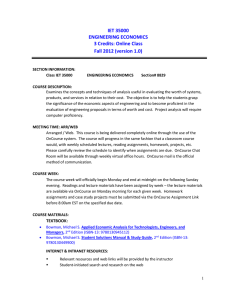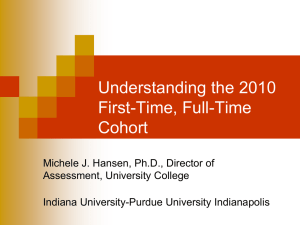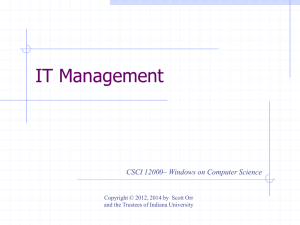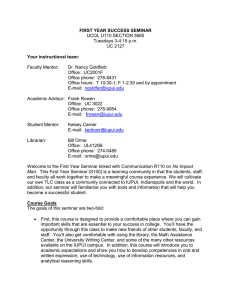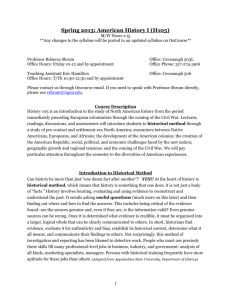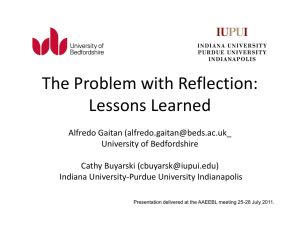U112 Critical Inquiry Syllabus - Resources for First Year Seminars at
advertisement
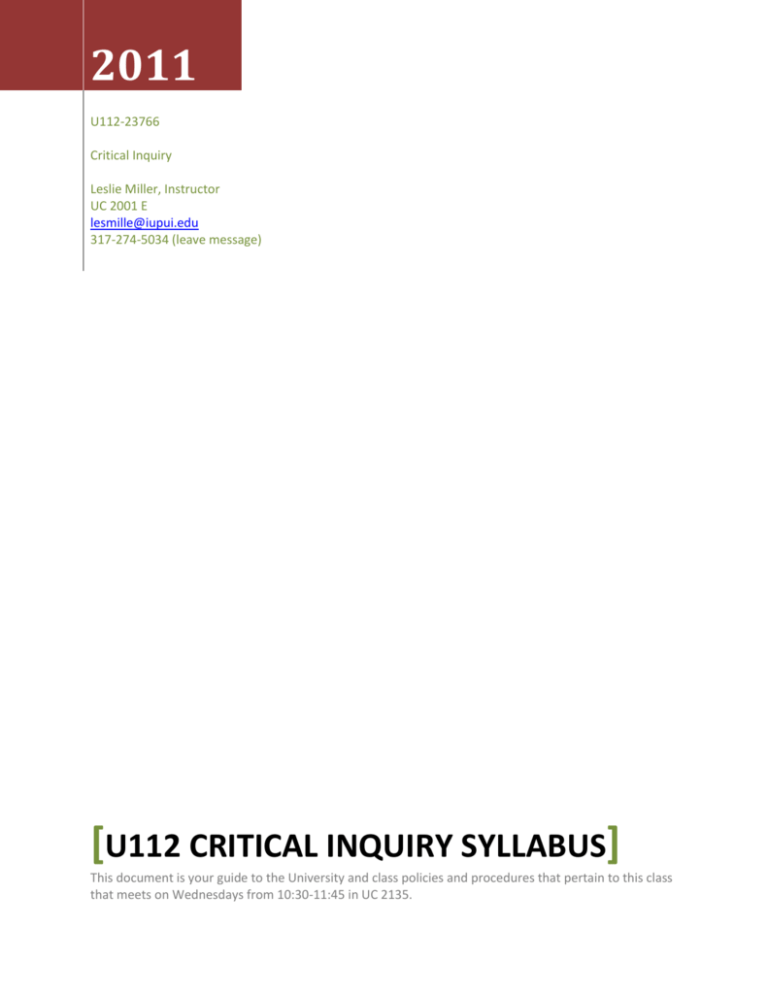
2011 U112-23766 Critical Inquiry Leslie Miller, Instructor UC 2001 E lesmille@iupui.edu 317-274-5034 (leave message) [U112 CRITICAL INQUIRY SYLLABUS] This document is your guide to the University and class policies and procedures that pertain to this class that meets on Wednesdays from 10:30-11:45 in UC 2135. Course Overview This course is designed to engage students in the use of interpretive and critical reading, writing, and thinking skills within a framework of intellectual development. Student Responsibilities Each participant will contribute to the class by actively participating in and occasionally leading discussions. Generally, content from UCOL U112 assigned readings will be the focus of our class discussion. Outside readings and activities will be required as assigned in class. We seek to function as a community of scholars. It is hoped that our meetings will provide a collegial and supportive environment for discussion. Keep in mind that attendance and class participation will constitute 30% of each student’s final grade. Textbooks Coelho, Paulo. The Alchemist. New York: HarperCollins Publishers, 1993. Various readings Course goals Students will: 1. actively pursue their own learning and see themselves as inquirers engaging in academic discourse 2. engage in interpretation, multiple viewpoints, and meaning-making 3. pose their own questions about discourse 4. evaluate and analyze multiple viewpoints 5. collaborate with other students on classroom discourse 6. connect and apply new knowledge to prior learning and life experience By the end of the semester, students should be able to: 1. make effective use of a learning journal 2. develop college-level vocabulary 3. use a method of Critical Inquiry to read, annotate, understand more fully and analyze complex reading material 4. improve ability to write critically about theoretical and applied views 5. apply theoretical and abstract ideas 6. have an awareness of their own intellectual development Class activities: 1. Identifying student-generated themes and areas of inquiry 2. Basing exploration of purpose, values, and meaning within the college experience 3. Writing a Learning Journal—learn annotation methods, develop raw material for inquiry and writing, develop college-level vocabulary 4. Discussing questions generated from critical reading 2 5. Answering quizzes: quiz questions will come from previous class materials and discussion 6. Participating in the Intellectual Journey Summit 7. Participating in Experiential Activities Supplies: Highlighters, flash drive, and a loose-leaf notebook for handouts & drafts. Principles of Undergraduate Learning: Our course goals support IUPUI’s Principles of Undergraduate Learning (http://www.iupui.edu/undergrad_principles.html), especially PUL#2: Critical Thinking Computer Needs: Though this class will not meet in a computer classroom, you will need consistent and frequent access to a computer with Microsoft Word and printer. All finished assignments (essays, writing logs, and portfolio submissions) must be typed and in the correct format. In addition, this class will make use of Oncourse for finished work and to communicate; therefore, you will need to check your Oncourse Messages frequently. Classroom Policies: 1. While drinks are permitted, no food, please. 2. No electronic devices permitted without permission. 3. Be aware that you are responsible for and can be held liable for activity on your computer accounts. 4. Turn off your cell phone prior to entering the classroom, or set to vibrate. 5. Use Microsoft Word so your files can be opened in class and in Oncourse. 6. Use only those programs/websites you are asked to access for class activities. 7. Save files in Oncourse/My Workspace/Resources as well as on your flash drive; loss of files is an invalid reason for failing to submit assignments. Attendance Policy: You are expected to become an active participant in an academic community of writers and learners; to contribute to the learning environment by attending class regularly, prepared with assigned work; to collaborate both online and face -toface and to meet all deadlines. Creating, contributing to, and m aintaining an effective presence in the classroom is a meaningful goal that will contribute to your success in this class. Clearly, you cannot contribute if you are absent. Attendance is worth 5 point per day. The only way an absence will be excused is with documentation (such as a physician’s note) submitted within a week of your return . If you only miss two classes, no penalty will accrue to your grade. So, while you should inform me of extenuating circumstances that result in a missed deadline or ab sence, the grade penalty begins with the 3rd unexcused absence regardless of the reason. Save your absences for emergencies and illness. Tardies can be as destructive as absences. Do not be late! (Be aware that 2 tardies = One absence.) Please let me know if you have difficulties getting to 3 class on time. If you do miss class, it is your responsibility to find out what you missed, including the homework assignments, for which you are still responsible. Any in-class work you miss due to absence or tardiness generally cannot be made up. If you miss class the day an assignment is due, you may e-mail it to me before 5:00 p.m. that day with no grade penalty. However, do not miss class because you don’t have an assignment ready; that practice will make you fall even further behind. Interaction on Oncourse regularly is part of your participation and attendance to the class; we “meet” frequently online. Failure to access Oncourse regularly to stay up-to-date on announcements, assignments, and electronic discussions will affect your grade. Policy on Late Work: Deadlines are important both in the university setting and in the workplace. W131 is a course that moves quickly, and success is very difficult without staying up-to-date with the assignments. NO late work* will be accepted without a doctor’s excuse, t ow-truck receipt, police report, or auto-repair receipt. Late work will also not be accepted if it you finish it in class during class time. (I do see you doing it.) You must back up your work so it will be available regardless of any situation; therefore, save all your work in Oncourse to be sure it is accessible. * An assignment is late once I have taken up the assignment in class. Penalties will be deducted per day the assignment is late. You may not submit the next assignment on the course schedule if you have not submitted the preceding one. You may not submit a portfolio unless all previous essays have been submitted and responded to by the instructor. Late drafts will be accepted for credit but will not receive feedback unless you come to my office for a conference. 4 Other Important Statements and Policies Administrative Withdrawal: We at IUPUI believe that attendance is a key factor in academic success and we encourage all students to attend all their courses’ meetings. Students who miss 50% of their class meetings of a given section during the first four weeks of the fall or spring semesters without contacting their instructor or department will be Administratively Withdrawn from that course without notifying the student. CAPS: If you find that life stressors are interfering with your academic or personal success, consider contacting Counseling and Psychological Services (CAPS). All IUPUI students are eligible for counseling services at minimal fees. CAPS also performs evaluations for learning disorders and ADHD; fees are charged for testing. For more information, see or phone (274-2548). Cell Phones and other electronic devices: I realize that cell phones, i-pods, laptops, etc. have become an extensions of our lives. You, however, are engaged in an endeavor as a college student that demands focus and attention. Therefore, when you are in class, silence your cell phones and put up your electronic devices. If you are waiting for an emergency call, please put it on vibrate and notify me that you must take a call. NO text messaging or checking messages in class (and I DO see you doing it!). Classroom Interaction: In our classroom we will accept and respect individual differences, seeking to foster an appreciation of openness . Students are expected to respect other students and their opinions regardless of race, ethnicity, gender, age, religion, or sexuality. Conferences: An essential ingredient to success in W131 is frequent communication with your instructor. Please feel free to ask questions at all stages of the course. Don't allow yourself to get behind due to problems choosing a project topic, understanding an assignment, or completing a research component. Call me, email me, and/or confer with me in my office (Taylor Hall 2001E). I want you to be successful! Disruptive students may face disciplinary action according to University policy. Visit http://www.jaguars.iupui.edu/handbook/2002/academicmisconduct.html for more information. Drop/Add Policy change: A late program change fee will be assessed beginning in the second week of classes for each schedule change. A schedule change within the same course involves one drop and one add and will be subject to a late program change. Students dropping courses prior to the end of the first week will receive a 100% fee credit for courses dropped. Students adding another class or changing a class (dropping to a different level or a different class) after the first week of class (Jan. 16) will be assessed the Late Program Change fee ($21.00). Classes may not be "swapped" without penalty fees. Beginning the second week of class, they will also forfeit 25% of the tuition for the class dropped and be charged 100% of the tuition for the added class. Third week the forfeit is 50%, fourth week the forfeit is 75%, and after the fourth week the forfeit is 100%. Please note this is in ADDITION to the Late Program Change fee ($21). As an example: you drop a class in the second week and 5 add a different class, you only get credit for 75% of the dropped class, you must pay the full tuition on the added class and you also get charged $20.75 for a late program change. (See the Registration Calendar for key dates.) Free Technology Training: Please visit http://ittraining.iu.edu/iupui/ to learn about free IT training and online tutorials in PowerPoint, Excel, Word, and many other programs. Folders: I will provide a folder for you that you will use to turn in all your work and have it returned to you. It also contains your Daily Grade Sheet. It should never leave the classroom. Grades: Your grade is based on your Daily Grade (10%), Warm -up Exercises (5%), the Midterm Portfolio (25%) and the Final Portfolio (60%). Incompletes are rarely given, and then only if at least 75% of the work has been completed at a passing level and extreme circumstances prevent completion of the remaining work by the last day of the semester. (Procrastination is not an extreme circumstance.) See the Writing Program’s policy on Incompletes at http://writing.iupui.edu/incomplete.htm Logs and miscellaneous points: Part of your assignments will include informal writing logs, warm-up exercises, and reading logs. These informal documents will allow you to practice what you are learning in class. I prefer they be typed, though they may be hand written if they legible and in pen to get credit. I also will be giving you point credit for various other pieces of work that will be put in the Log section of your grade sheet. Managing Your Files: It is essential to protect all your work by backing it onto a disk or drive, not just on your computer hard drive. (Cf. Oncourse.) If your work gets lost, even if it is lost after handing it in, it is your responsibility to replace the document(s). Pet Peeves: 1. DO NOT hand in work with ragged edges resulting from yanking paper from a spiral notebook!!! (If you use a spiral notebook, bring scissors to trim the edges.) 2. DO NOT e-mail me to ask for your grades. They are posted electronically, and you will see them in a timely manner. Plagiarism is defined by the IUPUI Writing Program as a violation of academic expectations about citing sources. We will discuss ways to avoid plagiarism in class. The Indiana University Code of Student Rights and Responsibilities (www.iupui.edu/code/) explains institutional penalties for plagiarism. These IUPUI policies will be enforced. Special accommodations are available for students with special challenges or disabilities that may affect their performance. If you are eligible for accommodations, register with Adaptive Educational Services (AES), which can be reached at 274-3241. Student Advocate Office: For problems you don't know how to solve, information you cannot find, and questions or problems that are affecting your academic progress, visit 6 the Student Advocate Office in CE 350. The advocate will answer your questions, direct you to the appropriate departments and people, familiarize you with university policies and procedures, and give you guidance as you look at ways to solve problems and make choices. Contact the Student Advocate Office or Josh Manlove at 278-7594 or at http://www.life.iupui.edu/advocate/ To find off-campus housing, please see the website at http://life.iupui.edu/advocate/housing.php Syllabus and Schedule: These are your guides to the class. Keep them in a handy place and refer to them frequently. If you know you will have to be out, you will still be able to keep up with your work. University Writing Centers: The UWC provides free assistance to students at any stage of the writing process. Please visit them for friendly advice about your writing assignments. Drop by or call CA 427 at 274-2049 or UL 2126 at 278-8171 to make an appointment. Visit them online at http://www.iupui.edu/~uwc/ Withdrawals must be initiated with a signed schedule adjustment (Drop/Add) form. Go to CA 401 for more information. yllabuas 7
